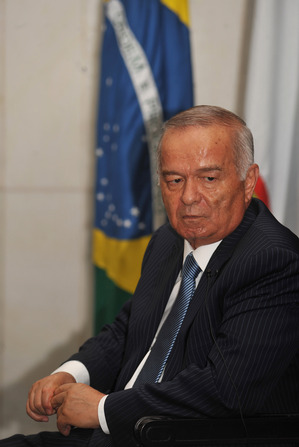Islam Karimov, the only president the sovereign republic of Uzbekistan has had since its independence from the Soviet Union in 1991, is shooting for his fourth consecutive term in office when the country's election is held March 29, 2015.
There are few visible opponents. Karimov makes sure of that. He takes care of them politically--or otherwise. Otherwise meaning they are not seen again on the political scene. The president appoints all judges and can remove them at any time.
Karimov, 77, has dominated the country's leadership since 1989, when he rose to be Communist Party leader in then Soviet Uzbekistan. In 1990, he became president and continued in the post after independence the following year.
Dictator that he is, the most populous Central Asian country still offers its 30 million residents voting privileges. Of course, the majority of the 17 million registered voters mark their ballots for you-know-who. Still, voting turnout averages 90 percent in a country where most citizens earn an average $3 to $8 a day, or about $2,200 per year.
Confirmed candidates to date are Islom Karimov of the Liberal Democratic Party, the current president; Khatamjan Ketmanov of the People's Democratic Party; Nariman Umarov of the Justice Social Democratic Party; Akmal Saidov of the National Revival Democratic Party.
The last three candidates have as much chance of unseating Karimov as the country has in creating a vehicle to fly to the moon. According to Uzbekistan's constitution, nobody can be elected president more than twice. Karimov conveniently has the constitution amended from time to time to skirt that regulation.
Uzbekistan has one of the world's most repressive governments. There is no legal political opposition. The media is tightly controlled by the state. Civil rights are an unknown quantity. Civil rights activists have fled the country.
Property ownership, although generally respected by local and central authorities, can be seized by the government when it feels a need to expand infrastructure such as roads, bridges, tunnels and parks.
A United Nations report has described the use of torture in Uzbekistan as "systematic." Corruption is widespread and has been for the last 25 years. The corruption has made Karimov and his family multi-millionaires.
Although Karimov claims to be in relatively good health, speculation in recent years has centered about his elder daughter, Gulnara, as his potential heir. She has been recognized as one of Uzbekistan's most powerful political and business figures, next to her father.
But, strangely enough, an apparent family power struggle in late 2013, coupled with several money-laundering investigations abroad, led to the daughter being placed under house arrest.
In 2014, prosecutors charged the daughter with belonging to a crime ring that had stolen $65 million (£40m) in government assets.
Despite frequent criticism of its poor human rights record, Uzbekistan's energy resources and strategic location have led both Russia and the West to seek closer ties.
Washington, for example, seldom criticizes Uzbekistan's human rights performance because the Asian country has allowed U.S. forces to set up a military base, giving the U.S. quick access across the Afghan border to help Afghanistan fight terrorist clans.
Uzbekistan is one of the world's biggest producers of cotton. It is also rich in natural resources, including oil, gas, uranium and gold. However, economic reform has been slow and poverty and unemployment (15 percent) are widespread. Central control of the economy dates back to the Soviet era.
More than 60 percent of the population lives in densely populated rural communities. Production of cotton and grain has relied on overuse of agrochemicals and has depleted water supplies. Much of the agricultural land is degraded, and the Aral Sea and certain rivers are half dry.
Still, the country has some positive points as well, especially for international tourists. For example, Uzbekistan is located on the Great Silk Road between Europe and Asia on which many neighboring countries (including Kazakhstan, Kyrgyz Republic, Tajikistan and Turkmenistan) promote their countries.
The majestic cities of Bukhara and Samarkand, famed for their architectural opulence, once flourished as trade and cultural centers. They remain unique tourism destinations. So is Tashkent, the capital, which also offers historical, archeological, architectural and natural treasures.
But if you are planning to fly Tashkent from New York City, for example, 6,318 miles, don't expect John F. Kennedy International Airport-type amenities.
The main airport at Tashkent is often cited as one of the worst in the world from the point of view of passengers. Hectic waiting conditions, often discourteous service, long delays and bureaucratic frustrations are everyday occurrences there.
And that's the way it is at this moment.

 By
By 
